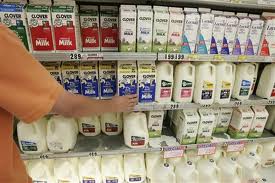Radiation Found in U.S. Milk
There is no health risk from consuming milk with extremely low levels of radiation, like those found in Washington state and California, experts said Thursday, echoing the U.S. Environmental Protection Agency.
"When we have a disaster like we've had with a nuclear power plant in Japan, we're probably going to find things that are truly not a public health risk, but I think it's very difficult for the public to assimilate this information and understand the risks," said Dr. Wally Curran, a radiation oncologist and head of Emory University's Winship Cancer Center.
The federal agency said Wednesday it was increasing its nationwide monitoring of radiation in milk, precipitation, drinking water, and other outlets. It already tracks radiation in those potential exposure routes through an existing network of stations across the country.
Results from screening samples of milk taken in the past week in Spokane, Washington, and in San Luis Obispo County, California, detected radioactive iodine, or iodine-131, at a level 5,000 times lower than the limit set by the U.S. Food and Drug Administration, officials said.
At that level, a person would have to drink 1,000 liters of milk to receive the same amount of radiation as a chest X-ray, said Dr. James Cox, radiation oncologist at Houston's MD Anderson Cancer Center.
The I-131 isotope has a very short half-life of about eight days, the EPA said, so the level detected in milk and milk products is expected to drop relatively quickly.
"The good news about iodine is, it has a short half-life," said Curran. "It doesn't dwell in any biologic system, be it an adult, a child, a cow, for any significant period of time, and at those levels there's no evidence that there's any medical significance."
Radiation gets into the milk because it falls on grass eaten by cows. The milk does not itself absorb radiation.
FDA senior scientist Patricia Hansen also said the findings are "minuscule" compared to what people experience every day.
Washington Gov. Chris Gregoire said tests confirmed the milk is safe to drink.


